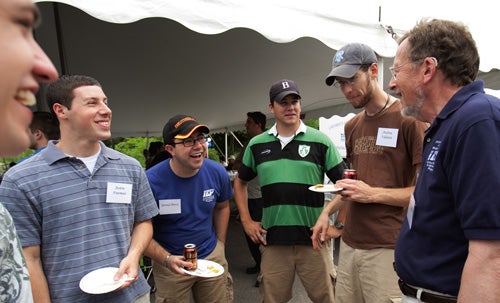Celebrating a Legacy

When John Grandin retired in June as executive director of URI’s International Engineering Program, he left behind a model that universities throughout the country are following and a long list of students and global corporations that are benefitting from his efforts.
Grandin, a professor of German, and former URI Engineering Dean Hermann Viets conceived of the idea of “internationalizing” engineering education by encouraging engineering students to study a foreign language—initially German, but later French, Spanish, and Chinese—and participate in an internship and study abroad. They believed that engineers with multicultural skills would be better prepared to enter the global workforce.
“There were some real doubters in the language and engineering programs when we proposed the idea,” Grandin said. “The language program has a firm tradition in the humanities and some colleagues feared an association with anything as pragmatic as engineering, whereas the engineers tended to think that any additional coursework should be strictly in technology. But we knew it would be beneficial to both.”
Their timing couldn’t have been better. Soon after they launched the program in 1987, the Berlin Wall came down and, coupled with a technology revolution, global opportunities skyrocketed. And the doubters soon became converts.
“People saw that good things were happening with the program,” said Grandin. “We were attracting better and more motivated engineering students, and enrollment in language classes increased significantly.”
One of the challenges resulting from the increasing popularity of the program was finding enough internship opportunities abroad. So Grandin found himself spending more and more of his time making contacts with large German companies like Siemens, BMW, Volkswagen, ZF and others. As the program expanded to include other languages, he expanded these efforts to companies in other countries.
When other universities began to follow suit and establish similar international engineering programs, Grandin launched an annual colloquium that now attracts about 165 engineering and language faculty, as well as representatives from the public sector and global companies to learn about the best practices in the field.
“That colloquium really put us on the map as the leader in the globalization of engineering education,” he said.
One of Grandin’s proudest moments as the program’s director was his establishment of the first dual degree master’s program in engineering, in which students studying engineering and German earn master’s degrees from URI and the Technical University of Braunschweig in Germany after spending time studying and conducting research at both institutions.
“It’s quite significant for students to have qualifications from both North America and Europe,” Grandin explained. “Degree recognition from two continents is a great entrée to the global workforce.”
In celebration of Grandin’s retirement, the International Engineering Program hosted its first alumni reunion on U.S. soil on June 5, and more than 250 people honored him at a dinner at the Dunes Club in Narragansett.
“To prepare generations of workers with a global mindset for the international work place the way that John has is an incredible accomplishment, and he did it in Rhode Island, a place many Americans have trouble placing on a map,” said Marshall Vale ’95, director of software engineering at iRobot. “John’s vision and hard work have made the IEP the crown jewel of URI.”
“I have heard from several recruiters and employers about how my résumé stands out because of my participation in IEP,” said Philip DaSilva, who graduated last May with degrees in mechanical engineering and German. “The reputation of the program and the people who have come out of the program are amazing.”
As part of the retirement celebration, a fundraising campaign was launched to establish an endowment with the aim of making the program financially independent of the ups and downs of the Rhode Island economy. The campaign has already raised more than $350,000 from alumni and corporate partners.
In retirement, Grandin hopes to serve as a consultant to other universities in need of guidance for their international engineering programs, provide assistance to the URI program as needed, and write a book about higher education. But mostly he looks forward to spending time at his family cottage in Maine.
“I love to swing a hammer,” he said, “so I look forward to spending plenty of time doing that.”
Grandin is confident he has left the URI program in good hands with its new director, Sigrid Berka, who he said is “dynamic and energetic, with good instincts to take the program forward.”
By Todd McLeish
Photo by Joe Giblin.
 Home
Home Browse
Browse Close
Close Events
Events Maps
Maps Email
Email Brightspace
Brightspace eCampus
eCampus


